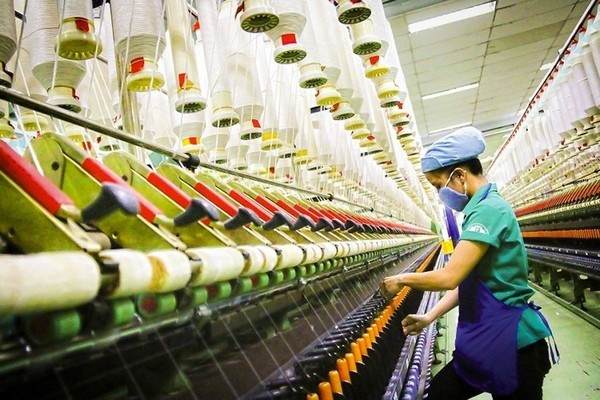
Enhancing skills for Vietnamese workers’ successful competitiveness in int'l market: NA Deputy
Latest
 |
| Enhancing skills for Vietnamese workers’ successful competitiveness in int'l market: National Assembly Deputy Nguyen Thi Viet Nga, (Photo: Courtesy) |
In the trajectory of economic and social development, labour productivity stands as the decisive factor in enhancing the economic prowess and competitiveness. Improving and catalyzing the growth of labour productivity constitutes a fundamental issue in propelling rapid and sustainable economic development, keeping pace with the standards of ASEAN countries and the world at large.
After more than 35 years of Doi Moi (Renewal), Vietnam has escaped the state of underdevelopment, transitioning into a country with average income levels, vigorously driving industrialization and modernization. The scale and potential of the economy have increased, international integration has deepened, ensuring social welfare while continuously elevating the income and living standards of its citizens, fostering social stability and progress.
Vietnam has significantly narrowed the gap with higher-developed ASEAN countries. In 2011, the labour productivity of Singapore, Malaysia, and Thailand was respectively 12.4 times, 4.3 times, and 2.1 times higher than Vietnam's. By 2022, these gaps decreased to approximately 8.8 times, 2.8 times, and 1.5 times, respectively.
According to calculations by a research group and references from the ILO, in 2020, Vietnam's labor productivity increased by only 5.4% (compared to 6.2% in 2019), the lowest in the past five years. Specifically, the average labor productivity reached 117.94 million VND, approximately 5,081 USD per laborer.
During the period of 2011-2020, Vietnam's labour productivity growth rate stood at 5.1%, higher than the ASEAN average, trailing only Cambodia. However, this growth rate still falls short in narrowing the gap with other countries. Specifically, Vietnam's labour productivity remains lower, being 26 times lower than Singapore, 7 times lower than Malaysia, 4 times lower than China, 2 times lower than the Philippines, and 3 times lower than Thailand.
According to the Department of Employment, under Ministry of Labour, Invalids, and Social Affairs, in 2020, Vietnam's unemployment rate was 2.51% (compared to 1.5% in 2019), the highest in the past five years.
Qualifications and skills of the labour force is not yet optimal
A 2020 report from the Asian Productivity Organization indicates that Vietnam's labor productivity lags behind Thailand by 10 years, Malaysia by 40 years, and Japan by 60 years. Despite having a sizable workforce of over 51 million people, ranking third in the ASEAN region, Vietnam's labor quality still faces limitations. The proportion of adequately trained labor, holding diplomas or certificates, remains below 30%.
Addressing this, National Assembly Deputy Nguyen Thi Viet Nga, Deputy Head of the Provincial Delegation of the National Assembly in Hai Duong, and a Member of the National Assembly's Committee on Culture and Education, highlights the necessity of emphasizing vocational education.
"Despite considerable efforts, Vietnamese labor hasn't fully adapted to the structural shifts in the economy, digital transformation, and international integration," she notes.
 |
| Enhancing skills for Vietnamese workers’ successful competitiveness in int'l market: The skills of Vietnamese workforce have made great progress. (Photo: VGP) |
Meanwhile, the disparity in labor productivity between Vietnam and other regional countries remains substantial. In Southeast Asia, from 2010 to 2019, Vietnam's labor productivity was only higher than Timor Leste, Cambodia, and Myanmar (according to data from the International Labour Organization (ILO) in 2019).
Citing the reasons, Nguyen Thi Viet Nga points out that the education and skills of Vietnamese laborers are still below the requirements compared to many regional countries. Among those with diplomas or certificates, a significant portion requires additional training upon entering the labor market, indicating the suboptimal quality of our vocational education. Additionally, the integration capacity of Vietnamese laborers remains weak, with skill levels lagging behind regional and global standards. Low labor skills serve as a significant barrier to efforts in enhancing labor productivity.
Focused approach in vocational education
Given the escalating demand for skilled labour to serve the comprehensive renewal, drive industrialization, modernization, and deep integration into the global economy, the Vietnamese workforce still faces limitations and shortcomings.
Member of Parliament Nguyen Thi Viet Nga suggests the necessity for solutions to boost labor productivity. Emphasizing vocational education, especially elevating the quality of vocational training, enhancing skills, and labor discipline, stands as a critical aspect. Strengthening investment in science and technology to improve labor infrastructure is crucial.
Vietnam, with its "golden population structure" and abundant labour force of over 51 million, accounting for over 55% of the population, holds the advantage to access advanced science and technology levels, creating competitiveness as the nation integrates globally, participates in production chains, supplies products, and attracts foreign investment resources.
The socioeconomic development strategy for the 2021-2030 period has identified human resources as the core, the most critical resource, and the target of development. Hence, there is a need to focus on comprehensive development of high-skilled human resources while also retaining competent officials and employees. This is seen as a breakthrough solution contributing to the successful implementation of strategic goals, propelling the nation into rapid and sustainable development.





















